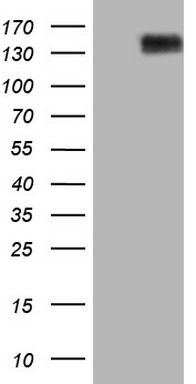CD13 (ANPEP) Mouse Monoclonal Antibody [Clone ID: OTI2F10]
CAT#: CF807396
Carrier-free (BSA/glycerol-free) ANPEP mouse monoclonal antibody, clone OTI2F10 (formerly 2F10)
Formulation: Standard
Frequently bought together (2)
Other products for "CD13"
Specifications
| Product Data | |
| Clone Name | OTI2F10 |
| Applications | IHC, WB |
| Recommended Dilution | WB 1:2000, IHC 1:150 |
| Reactivities | Human |
| Host | Mouse |
| Isotype | IgG2a |
| Clonality | Monoclonal |
| Immunogen | Human recombinant protein fragment corresponding to amino acids 668-967 of human ANPEP (NP_001141) produced in E.coli. |
| Formulation | Lyophilized powder (original buffer 1X PBS, pH 7.3, 8% trehalose) |
| Reconstitution Method | For reconstitution, we recommend adding 100uL distilled water to a final antibody concentration of about 1 mg/mL. To use this carrier-free antibody for conjugation experiment, we strongly recommend performing another round of desalting process. (OriGene recommends Zeba Spin Desalting Columns, 7KMWCO from Thermo Scientific) |
| Purification | Purified from mouse ascites fluids or tissue culture supernatant by affinity chromatography (protein A/G) |
| Conjugation | Unconjugated |
| Storage | Store at -20°C as received. |
| Stability | Stable for 12 months from date of receipt. |
| Gene Name | alanyl aminopeptidase, membrane |
| Database Link | |
| Background | Aminopeptidase N is located in the small-intestinal and renal microvillar membrane, and also in other plasma membranes. In the small intestine aminopeptidase N plays a role in the final digestion of peptides generated from hydrolysis of proteins by gastric and pancreatic proteases. Its function in proximal tubular epithelial cells and other cell types is less clear. The large extracellular carboxyterminal domain contains a pentapeptide consensus sequence characteristic of members of the zinc-binding metalloproteinase superfamily. Sequence comparisons with known enzymes of this class showed that CD13 and aminopeptidase N are identical. The latter enzyme was thought to be involved in the metabolism of regulatory peptides by diverse cell types, including small intestinal and renal tubular epithelial cells, macrophages, granulocytes, and synaptic membranes from the CNS. Human aminopeptidase N is a receptor for one strain of human coronavirus that is an important cause of upper respiratory tract infections. Defects in this gene appear to be a cause of various types of leukemia or lymphoma. [provided by RefSeq, Jul 2008] |
| Synonyms | APN; CD13; GP150; LAP1; P150; PEPN |
| Reference Data | |
| Protein Families | Druggable Genome, ES Cell Differentiation/IPS, Protease, Transmembrane |
| Protein Pathways | Glutathione metabolism, Hematopoietic cell lineage, Metabolic pathways, Renin-angiotensin system |
Documents
| Product Manuals |
| FAQs |
| SDS |
Resources
| Antibody Resources |
{0} Product Review(s)
0 Product Review(s)
Submit review
Be the first one to submit a review
Product Citations
*Delivery time may vary from web posted schedule. Occasional delays may occur due to unforeseen
complexities in the preparation of your product. International customers may expect an additional 1-2 weeks
in shipping.






























































































































































































































































 Germany
Germany
 Japan
Japan
 United Kingdom
United Kingdom
 China
China












